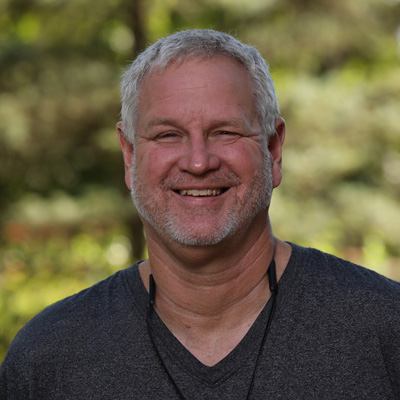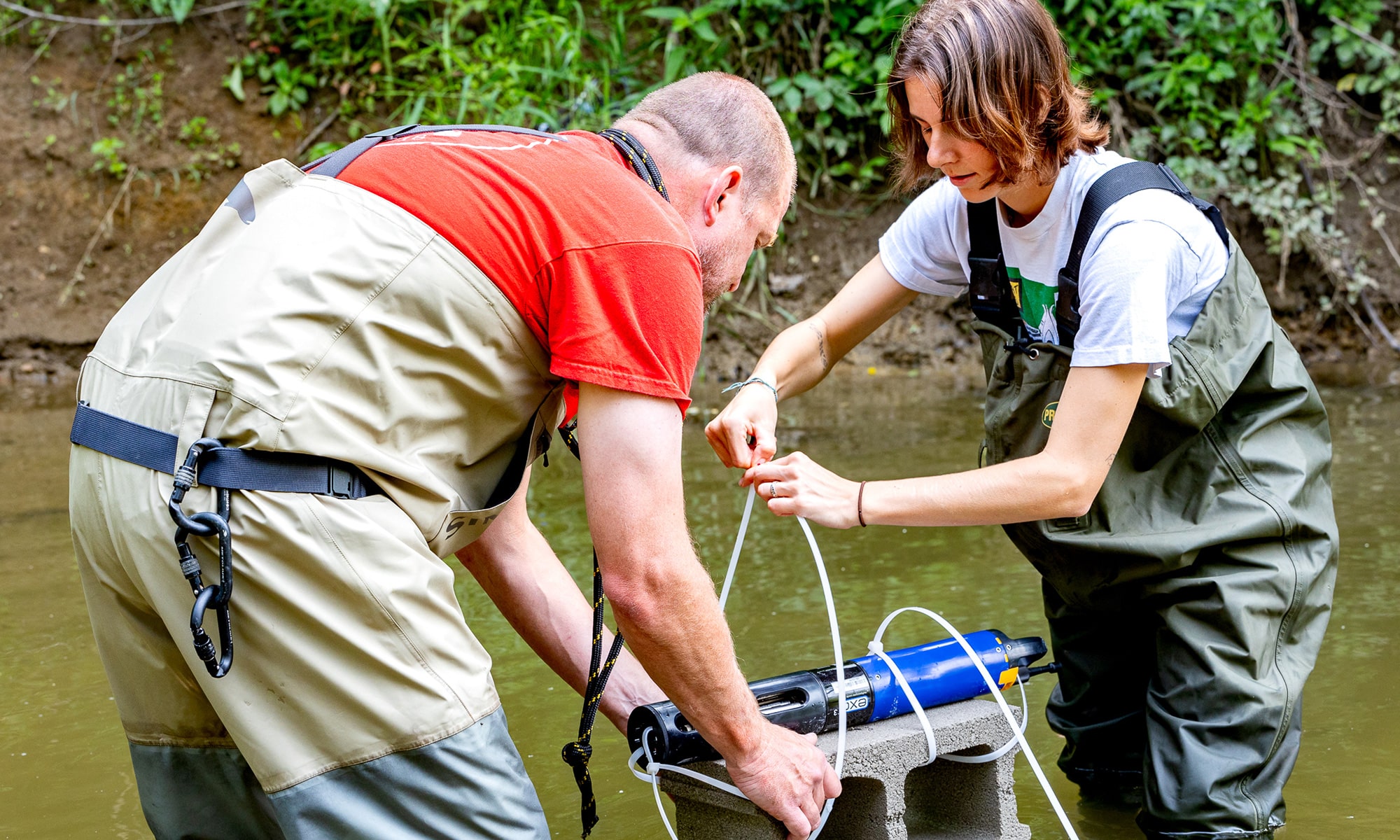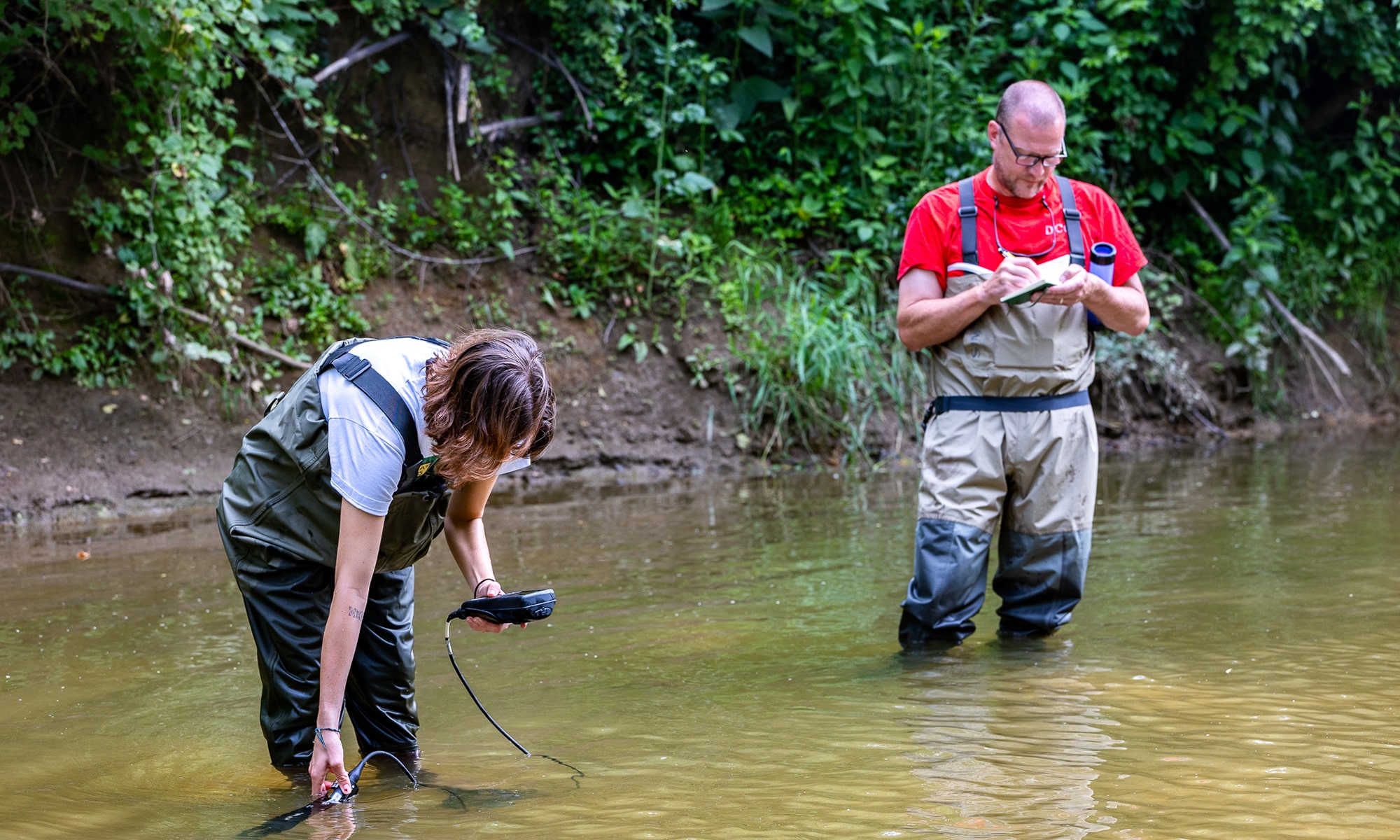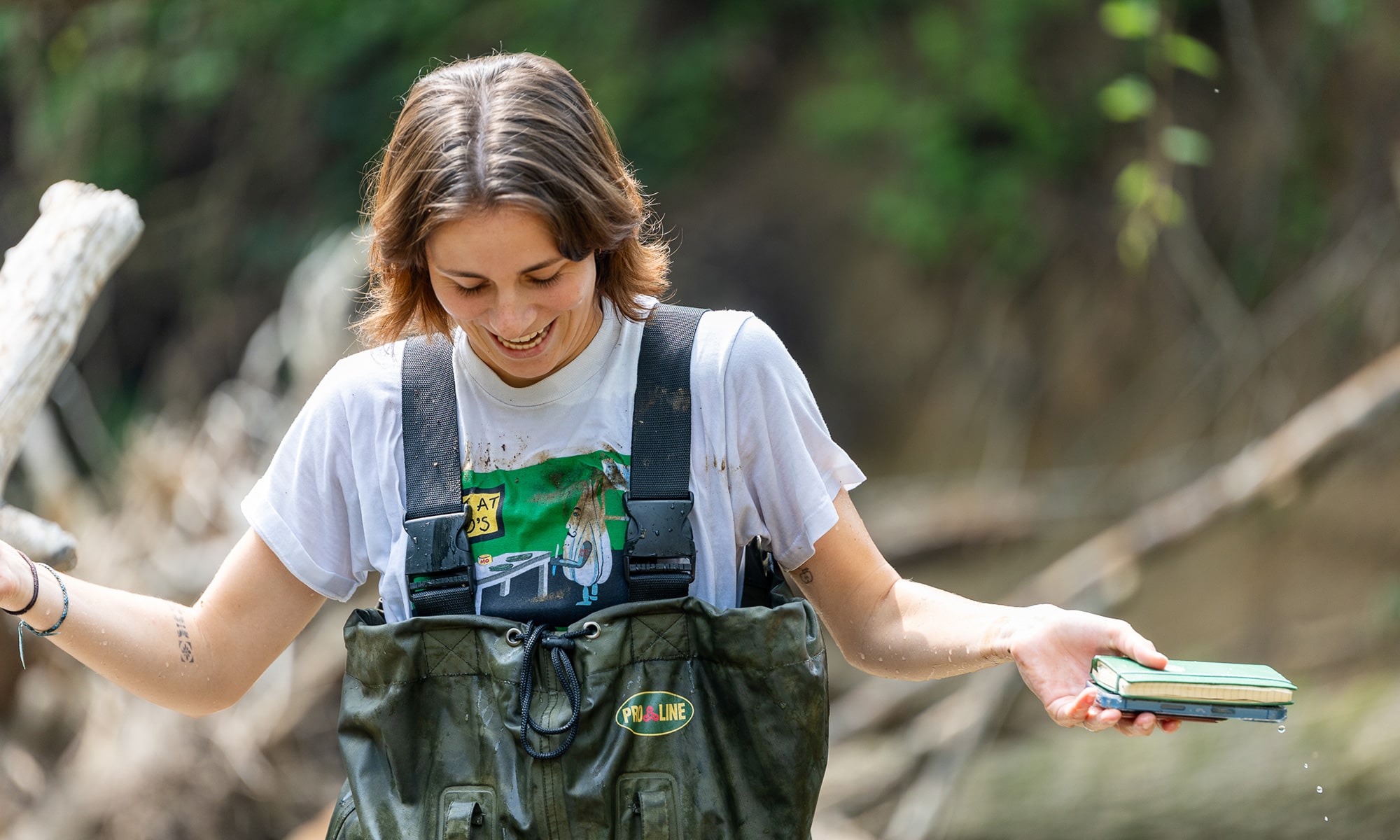Clad in nylon waders and standing knee deep in Raccoon Creek, Caroline Lopez ’25 wields a sledgehammer in the name of science.
Birds sing from the trees on this sunny summer morning. Insects skitter across the water’s surface while fish, mollusks, beavers, and muskrats scurry below.
Lopez can’t stifle her laughter as she pounds the top of a metal fence post, which helps anchor a submerged data collection device tethered to a cinder block. As the tip of the fence post disappears below the surface, hilarity follows.
Each swing produces a bigger splash.
“You’re doing great; let’s see those tennis muscles,” professor Dave Goodwin says to Lopez, a member of the varsity women’s tennis team.
With a wry smile, she completes the arduous task – mooring one of five data collection devices she’s deployed to assess the biogeochemical cycles in the creek. It’s all part of her Summer Scholars project led by Goodwin, chair of the Earth and Environmental Sciences department, who serves as her mentor, research guide, and good-natured tormentor.
Wading through the creek, the professor quizzes Lopez on data gathered at points upstream and downstream from large woody accumulations such as fallen trees. He challenges her to determine whether the findings support her hypothesis that more cellular respiration should be found behind woody debris than in front of it.
Goodwin creates an environment that promotes critical thinking while leaving room for a bit of whimsy. He mixes science talk with random questions about Lopez’s favorite bands and sci-fi flicks — her every response provoking a critique.
The student gives as good as she gets.
“I’m super happy with my decision,” Lopez says. “I’ve been given the resources and guidance to do the project, and it’s up to me to expand on it. Dave pushes me, but he also likes to joke around. It’s all in good fun.”
Change of plans
At the heart of the Summer Scholars program is the opportunity to take what’s learned in the classroom and apply it to independent study. Endowed funds annually support about 120 students across all disciplines. The students are paid for their work, which often contributes to existing research.
Lopez’s project was made possible by the Laurie Bukovac Hodgson & David Hodgson Endowed Fund, which was created through the generous philanthropy of Denison alumna Laurie Bukovac Hodgson ’81 and David C. Hodgson.
Nowhere in the list of requirements does it mention baking a grapefruit and rhubarb upside down cake for the professor. Lopez does it anyway as a show of appreciation, delivering the tasty dessert to Goodwin’s family home during a visit.
“Caroline has many talents,” Goodwin says. “I love coming to work and helping young people who are trying to figure it out.”
The student-mentor bond is an important facet of Summer Scholars, which provides students a chance to work with professors in one-and-one and small-group settings and can serve as a gateway to other opportunities.
A year ago, Lula Burke ’24, who recommended the Raccoon Creek project to Lopez, took part in the research led by Goodwin and earth and environmental sciences professor Matthew Jungers. Later, when she applied for an internship at the Smithsonian Museum of Natural History, Goodwin wrote Burke’s letter of recommendation.
Goodwin hadn’t planned to work at Raccoon Creek in the summer of 2023, but after having Lopez in two of his classes he changed his mind.
“I’ve been teaching here for 20 years, and I recognized Caroline’s aptitude and enthusiasm,” Goodwin says. “When a student is engaged in a project, it’s part of my job to say yes to that.”
Doubling up
Lopez, a Los Angeles native, arrived at Denison as an English literature major. She loves to read and write, which isn’t surprising given that her parents, Steve and Alison, are prominent journalists. In her spare time, Lopez feeds her creative appetite by working as the art director at WDUB, the college’s radio station.
She also has a burgeoning interest in science. Lopez enjoyed studying geology in high school and decided to take Goodwin’s course in historical geology her first year.
She was immediately hooked, adding Earth sciences as a second major.
Lopez became fascinated with the processes of the natural world and what causes changes to the atmosphere and water cycles. While she wanted to see old friends in Los Angeles, she knew how she needed to spend her summer.
“In our department, research is almost a rite of passage,” she says.
Before approaching Goodwin about Summer Scholars, Lopez consulted her friend Burke.
“That research project in Raccoon Creek has been one of the most fun and interesting experiences I’ve had at Denison, and the interaction with Dave and Matt was the best part of it,” Burke says. “Dave forces students to reckon with being good learners, notetakers, and problem solvers. He’s also really funny.”
Getting messy
As a college athlete, Lopez is used to humbling moments. So after losing her balance and plunging sideways into the creek, the tennis player pops up in a fit of laughter.
Goodwin praises her for keeping the handheld monitor dry during the fall, but he also wants the scene documented.
“Take a picture of that,” he tells a university photographer.
Lopez removes a soggy notebook from her waders before slogging to the creek’s banks to continue her work. She pilots the department’s drone to provide a bird’s-eye view of the woody debris in the creek.
“Take it up higher,” Goodwin instructs.
“I don’t want to hit anything,” Lopez responds.
“The next thing you are going to hit is the moon,” Goodwin says.
After landing the drone, student and professor return to dry land. Lopez’s research is building on the work of Burke and Anna Grendys ’23 last summer. The goal, Jungers says, is to continue the Raccoon Creek summer project indefinitely, providing a comprehensive look at the waterway’s health. The study is timely given the considerable amount of industrial construction and growth expected in the area. Lopez’s research could contribute to a before-and-after assessment.
For Lopez, the future is wide open, but she says her combination of English lit and Earth sciences majors could lead to scientific publications or research to influence environmental legislation.
Goodwin believes she’ll leave Denison well-equipped to handle a variety of challenges.
“If you can write and you can think clearly about how the physical world works, especially in the face of climate change, you will be uniquely positioned to be successful,” he says.
For now, Lopez is doing valuable research alongside Goodwin to prove her hypothesis and to show her work. On this day, it includes walking back to her car, turning her waders upside down, and watching a gallon of Raccoon Creek come whooshing out.











